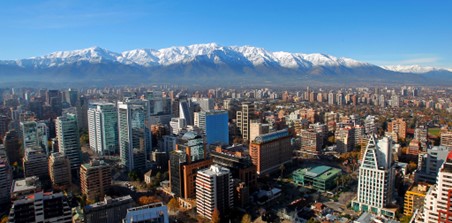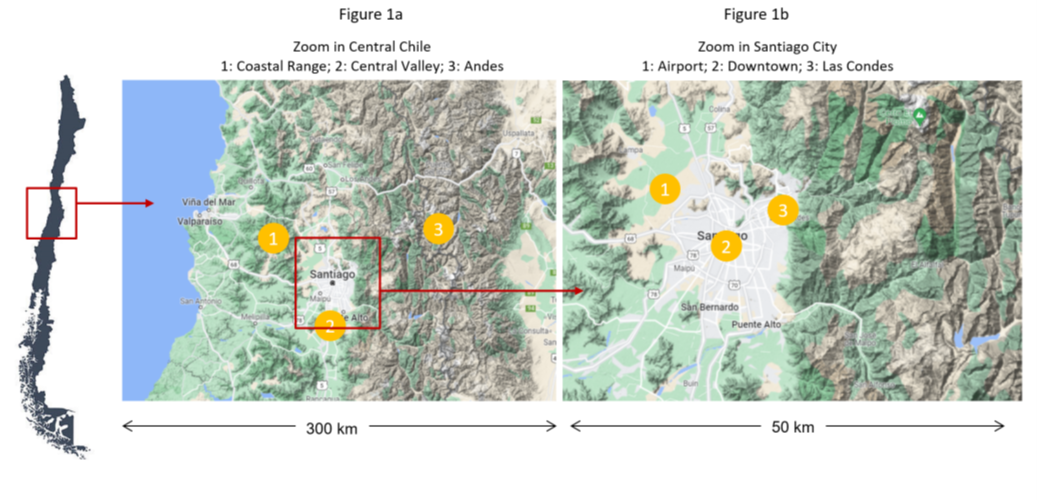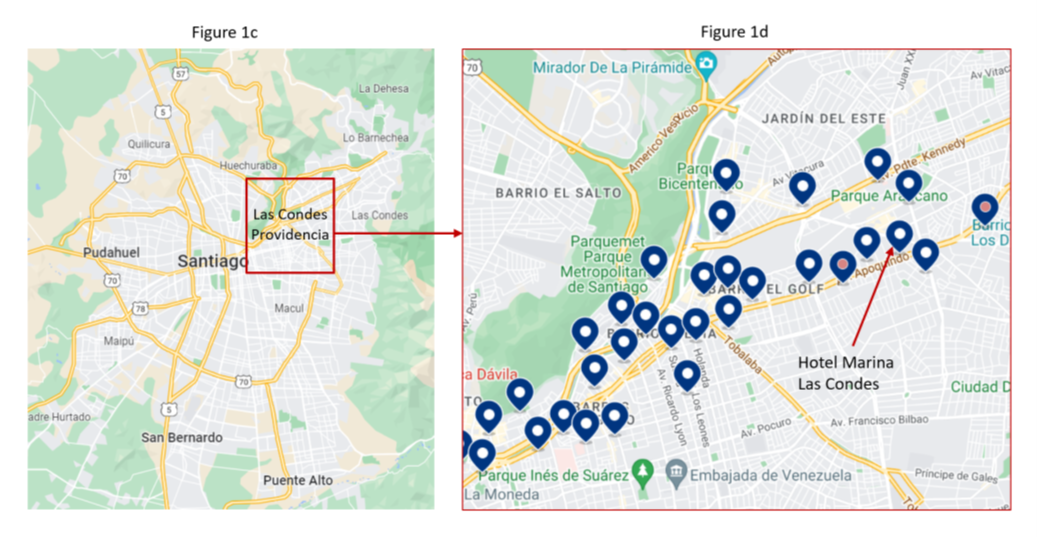
| Home | Committee | Program | Keynote Speakers | Registration | Logistic Information | Sponsors |
The International Atmospheric River Conference 2022 will be held in-person in Santiago, Chile.
| About Chile and Santiago | Venue and nearby hotels | Tips for travelers | Covid19 requirements | Electricity and Communications | Tourism in Chile |
About Chile
Chile is a long, narrow country that extends from the Andes Mountains to the Pacific Ocean on the southwest side of South America, from latitude 17° 30′ S in the Altiplano to 56° 30′ S at the far end of continental Chile (Figure 1). Accordingly, Chilean’ climate encompasses a variety of conditions including the hyper-arid Atacama Desert in the north, the Mediterranean-like center part and the rainy, temperate western Patagonia in the south.
Chile’s main territory is roughly twice the size of Germany and consists of a strip of land 4,200 km long and 90 to 440 km wide. In the far south, the land is transected by hundreds of islands and fiords. Our territory also includes Rapa Nui (Easter Island) and a portion of Antarctica.
Santiago is the country’s capital and largest city in terms of population and employment, with more than 6 million inhabitants. Located on parallel 33° S, at roughly the same latitude as Buenos Aires and Montevideo, Santiago is the country’s main political, economic, cultural and industrial center. It is the gateway to Chile and one of the most modern capital cities on the continent.
The city of Santiago is located at foothills of the Andes, just in the Central Valley, at about 500 meters above sea level, presenting a light slope from east to west (Figure 1a,b). The overwhelming presence of the mountain range can be appreciated in the valley by San Cristobal and Santa Lucia hills. We plan a short field trip on Wednesday (12 October) afternoon.
The 4th IARC will take during late spring, and we expect mild-to-warm, mostly dry weather for most of the time. Mean temperatures for October range between 15-25°C.
Venue and nearby hotels
Relevant Update, August 24: We negotiated a special rate with the hotel Best Western Premier Marina Las Condes (Conference venue). Per passenger, per night values are US$ 130 (single) and US$ 145 (double) + 20% tax. Foreign travelers can waive this tax if (a) show their passport + custom document and (b) pay in US$ (credit card or cash). If you wish to reserve in this hotel, please fill out this form and send it to the reservation department: reservas.scl@marinahoteles.cl
The conference will be conducted in the hotel Best Western Premier Marina Las Condes, located in the eastern side of the city (Figure 1c-d). The hotel is located in the center of the Las Condes neighborhood, two blocks from Avenida Apoquindo, one of the city’s most important east-west corridor. The hotel is close to commerce and restaurants, easily accessible by public transportation, including a Metro (subway) station at a walking distance.
Participants can stay in that hotel or elsewhere. We strongly recommend hotels located in Providencia or Las Condes area, ideally at a walking distance from the Subway Line 1, because the Metro de Santiago is the most effective (and safe) way to move around the city. Hotel rates in Santiago range between US$ 70-200 per night. Make your own reservations directly at the hotel or in Booking.com; Trivago.cl; Airbnb.cl.
Tips for travelers
To enter Chile, all passengers have to show their identification documents (identity card or passport) and the stamped visa (depending on country of origin). Citizens of South America, the European Union, the United States, Canada and Australia do not require a visa although some passengers (coming from Canada, Australia, Mexico, Albania) have to pay a reciprocity tax (in cash) when they arrive to the airport in Chile.
Citizens of the European Union and New Zealand are not required to pay a fee. Upon entering the country, visitors receive a 90-day tourist visa that can be extended for another 90 days.
Passengers are strongly recommended to hire an official transport from the Airport to the Hotel, about 30 min away. The one-way trip in a taxi is about US$ 50.
Covid19 requirement for foreigners not resident in Chile
Official information is available at this government site. Please visit it frequently for updates
New (and simple) protocol after September 1st:
- In Chile we encourage the entry of foreigners who have their vaccines against Covid-19. As of September 1st, you will have to present the vaccination certificate issued in your country when boarding to Chile.
- Those who do not have their vaccinations must present a negative result in a PCR test dated less than 48 hours from departure, to enter Chile.
- The vaccination certificate -together with your identity document- will be valid as a Mobility Pass, so you can enter hotels, restaurants or take flights within Chile.
- We have improved our border control processes to make them more expeditious, so it will no longer be necessary to fill out the C19 Declaration.
- As of September 1st, minors under 18 years old will not be subject to any requirements to enter Chile.
Electricity and Communications
The electrical current in Chile is 220 Volts and 50 Hertz. Three-terminal electrical adapters are not common, but two-terminal converters can be found at stores that sell electrical equipment. Meanwhile, communications in Chile are ample and varied, including public telephones, mobile phones and satellite phone service. You can find broadband Internet almost anywhere in the country, and WiFi service is available in the main cities.
Official Tourism Site in Chile: Destinations and Experiences
Plan your trip to Chile quickly and simply. North and the Atacama desert, central area, Santiago and Valparaiso, Easter Island, the south, its lakes and volcanoes, patagonia and Antarctica.
https://www.visitchile.com/es/
For further information, please contact the Conference Implementation Committee.



